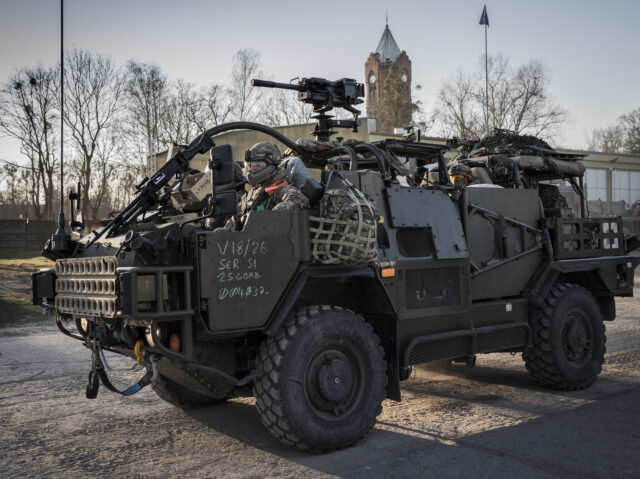
The UK government is very seriously concerned about the potential for domestic conflict but has to dress up preparations for such an eventuality under the “logically absurd” pretext of a land invasion of the British Isles by Russia, a professor of war has asserted.
“For the first time in many years, we have to actively prepare for the possibility of the UK homeland coming under direct threat”, the UK government said in its 2025 National Security Strategy last month, warning that “critical national infrastructure – including undersea cables, energy pipelines, transportation and logistics hubs” are a major target. Responding to the contents of the long-anticipated Whitehall paper, Professor David Betz of King’s College London called the government attempting to pass off work to harden critical national infrastructure against sabotage by invoking a foreign invasion by countries like “Russia, China, Iran and North Korea” expedient but essentially dishonest.
‘We’re Already Past The Tipping Point’: Academic Sounds ‘Civil War’ Warning For High-Migration Western Nationshttps://t.co/xRTPExhACJ
— Breitbart London (@BreitbartLondon) June 14, 2025
Betz is an emerging voice in the public sphere on the risks Western nations run with low-quality political decision making pushing their respective societies toward civil conflict, something he says normalcy bias and a lingering perspective that civil war is something that only happens to poor, non-Western countries has blinded many leaders and thinkers to. In remarks broadcast from a discussion with Professor Lewis Halsey, Professor Betz reflected: “there is growing apprehension about the security of Britain, the security of its infrastructure specifically, and about the potential for active conflict at home in a very direct manner, effecting people in a very direct manner.
“But that’s not external in origin, that’s internal, and that has to do with the way our society is now configured, it is highly fractured. Low trust, highly fractured, and highly politically factionalised which is leading us increasingly inevitably into civil conflict.”
Specifically reacting to the government briefing in recent weeks that it is now preparing for a potential foreign military invasion of the British Isles — despite the country being several hundred if not thousands of miles away from any conceivable aggressors — Betz said: “the government when they talk about this, tends to talk about Russia.
“The fact of the matter is there is a great distance between us and Russia… we are not militarily threatened in a direct way on the ground by any obvious external enemy, even Russia. Which isn’t to say there aren’t things which Russia could do to attack the UK should they wish to, but one of those is not occupying the village green with Russian soldiers, that simply, frankly, is a rather bizarre assertion.”
Britain to Launch Home Defence Force to Protect Critical Infrastructure From ‘Enemy States and Terrorists’: Reporthttps://t.co/zG4KzArpvZ
— Breitbart London (@BreitbartLondon) May 20, 2025
Professor Betz said he believed this claimed obvious falsehood is, in fact, an expedient fig leaf to cover the real but politically poisonous purpose for its sudden interest in hardening key strategic and critical infrastructure sites against attack. He continued: “what they’re concerned about is domestic conflict, and they perfectly understand this, but that’s completely politically toxic for them to say so publicly, hence the convenience of saying ‘we need to develop… a citizen’s militia for the protection of critical infrastructure’. To say that we’re doing this against the potential of Russian attack, which is frankly a logically absurd proposition, but it is convenient as a pretext.”
While Professor Betz cites the academic literature on civil war to assert there is at least a possibility the United Kingdom exhibits the signs of being in a pre-war state, and that the classic markers of instability are all present, he also emphasised that his preoccupation with Britain is because he lives there, and in fact “all of the major countries of Europe and the United States” have the same problems.
Betz’s comments follow government plans briefed to the press in the past month of a potential return to a home defence force to protect key infrastructure sites including nuclear power stations, airports, and critical cables from sabotage. Previous manifestations of such an organisation date back to the 18th and 19th centuries with the Militia and British Volunteer Corps Yeomanry, later revived with the Home Guard in the Second World War and the short lived Home Service Force in the 1980s.
Per these claimed plans, the new home defence force could be a voluntary force of retired soldiers. The concept received a one-line reference in the National Security Strategy paper, which stated obliquely: “our plans for Home Defence will focus on the protection of critical national infrastructure and countering sabotage during a crisis (potentially modelled on the Reserves). We will also run annual National Exercises in order to test our whole-of-society preparedness.”
The paper also said, in lines that were widely reported in the media, and later cited by Professor Betz:
Threats to the homeland from state actors are increasing… Meanwhile, critical national infrastructure – including undersea cables, energy pipelines, transportation and logistics hubs – will continue to be a target.
…some adversaries are laying the foundations for future conflict, positioning themselves to move quickly to cause major disruption to our energy and or supply chains, to deter us from standing up to their aggression. For the first time in many years, we have to actively prepare for the possibility of the UK homeland coming under direct threat, potentially in a wartime scenario.
Modern Life Under Attack: 2024 Should Have Been the Year the West Woke up to Infrastructure Sabotage https://t.co/MB4ZOQjQlH
— Breitbart London (@BreitbartLondon) January 2, 2025
